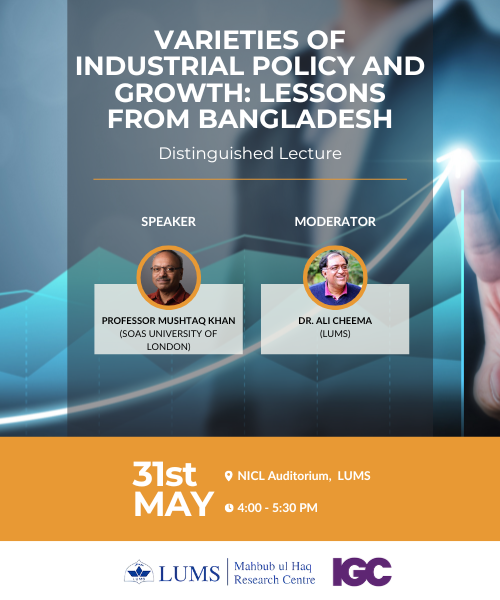Varieties of Industrial Policy and Growth: Lessons from Bangladesh.
Since the early 1980s, Bangladesh achieved relatively high growth in its manufacturing industries, led by garments and textiles, and later pharmaceuticals. While earlier industrial policies based on conventional incentives had performed poorly, growth was now driven by new forms of incentives that successfully induced the learning of technical and organizational capabilities. With hindsight, these strategies worked because they were compatible with the political settlement because they prevented powerful groups capturing policy rents without delivering results. There are obvious lessons for the design of effective industrial policies in Bangladesh and elsewhere.
Varieties of Industrial Policy and Growth: Lessons from Bangladesh.
Speaker: Dr. Mushtaq Khan (SOAS)
Moderator: Dr. Ali Cheema (LUMS)
Venue: NICL Auditorium, LUMS
Date: 31st May 2024
Time: 4:00 - 5:30 PM
Registrations close on Friday, 31st May at Noon.
Dr. Mushtaq Khan (Speaker):
Dr. Mushtaq Khan is a Professor of Economics at SOAS University of London. He is a leading thinker on political settlements (an analytical framework he developed for assessing why institutions perform differently across countries), effective policy implementation, governance, industrial policy, institutional economics, political economy, and anti-corruption.
He is also head of the FCDO (UK government)-funded Anti-Corruption Evidence Research Consortium (SOAS-ACE) and joint head of the FCDO funded SOAS-Yale partnership. The SOAS-ACE research consortium has developed an innovative evidence-based approach to identify feasible (enforceable) and high impact anti-corruption strategies in countries with a weak rule of law (https://ace.soas.ac.uk/), and is recognized as one of the important research programmes currently supported by the FCDO. Prior to this Professor Khan has led multidisciplinary and multi-country research programmes informing development policy, including UK aid’s three-year Governance and Growth Research Programme 2007-2010, conducting research in Bangladesh, Tanzania, India and Thailand on political settlements, technology policy, and the evolution of property rights. His work has been published with leading presses like Cambridge University Press and Routledge and in leading journals such as the American Economic Review and World Development.
Before joining SOAS Professor Khan was faculty at the University of Cambridge. He did his BA (Hons.) in Politics, Philosophy, and Economics from the University of Oxford and his M-Phil and PhD in Economics from the University of Cambridge.
Dr. Ali Cheema (Moderator):
Dr. Ali Cheema is the Vice Chancellor of LUMS. He is an Associate Professor of Economics at the Mushtaq Ahmad Gurmani School of Humanities and Social Sciences. He joined LUMS in 1999 and served as the Chair of the Economics Department from 2004 to 2010. He is also a co-lead academic of the International Growth Centre’s Pakistan program, an Invited Researcher at Abdul Latif Jameel Poverty Action Lab (J-PAL) at MIT, and a member of Evidence in Governance and Politics (EGAP). He has also served on high-level provincial and federal government task forces and commissions, including the National and Punjab's Provincial Finance Commissions. He is also a serving director of the State Bank of Pakistan.

Mahbub ul Haq Research Centre at LUMS
Postal Address
LUMS
Sector U, DHA
Lahore Cantt, 54792, Pakistan
Office Hours
Mon. to Fri., 8:30 a.m. to 5:00 p.m.

